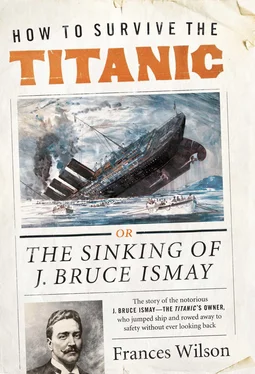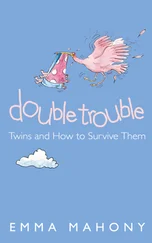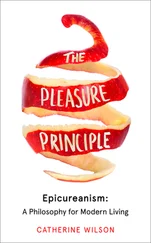Ismay wanted to make a second statement to the press in which he could explain, in his own words, his behaviour on the Titanic. ‘I don’t think the portion of the public whose opinion we value,’ Harold Sanderson carefully advised him, ‘requires any further instruction as to your views or the merits of your action. The subject is dying and no longer interests them and I would leave it alone.’ Prevented from talking about the disaster both in private and now in public, Ismay told Sanderson that ‘I am afraid we look at the position from entirely different points of view; you have not been attacked, whereas I have, so you can easily afford to sit still and do nothing.’ 6Ismay had never been good at doing nothing.
The report of the British Board of Trade inquiry was published on 30 July, after which Franklin came over to England on White Star business. He spent some time with Ismay and returned to New York on the Olympic, where he wrote thanking him for his ‘frank and generous hospitality… you have always been most courteous and kind to me, and it was always a great pleasure and honour for me to serve under you’. Because he has never before travelled on the Olympic, Franklin ‘had no idea what a splendid, comfortable and marvellous steamer she is, but all the time I cannot help thinking of your good self — the man that had the nerve and ability to order and plan her, and then of what happened, and it all seems too cruel, but I suppose there was some good reason for it’. Franklin, who has only now been told that Harold Sanderson is to take over the presidency of the IMM, ‘feels hurt’ that no one informed him of the secret arrangement. He understands that ‘recent developments’ have made it ‘clear’ he will never be promoted to the position of president himself, and feels ‘a little blue about my future’. He closes by saying that Ismay’s ‘position regarding the Titanic is improving every day’, and that he has ‘absolutely nothing to reproach [himself] with. You were saved for some good purpose and must take advantage of it.’ 7
In August, Ismay writes again to Marian Thayer. Still unable to face work, he has been shooting in Yorkshire for three weeks and is about to return there. ‘I love it so. The heather and grass.’ But despite the isolation, he has not been happy. ‘I always have the memory of that awful time before and cannot think of anything properly. How I wish the hands of the clock could be put back. Think of all our ambitions ended — at least mine are — and all one’s work ruined.’
Ismay tells everyone, not only Mrs Thayer, that the first half of his life is now meaningless. William Boulton, a soldier who has known him for years, tells Ismay to ‘not say again your life is ruined — don’t say it, or even admit it to yourself. You are still suffering from nerve shock which would have broken most men down and you are not competent to judge.’ It is vital, Boulton continues, to stop all this ‘morbid introspection’; to let ‘your friends estimate your worth and tell you what value they place on your life’s work’.
Ismay receives other letters of consolation: Mary Anna Maxwell Stuart, the sister of an old friend and the great-great-granddaughter of Sir Walter Scott, tells Ismay ‘how perfectly frantic with indignation we are at the way you have been treated! As if anyone who had ever known you could have believed you capable of any mean action!’ 8Captain Mark Kerr writes on Admiralty notepaper to express his ‘indignation at the unjust, abominable and lying accusations against you in some of the press and by some ignorant people. Anyone who knows you and knows the sea, and ships, and occasions of excitement there, will see that your behaviour was most proper in every way.’ He continues on a more contemporary note: ‘Hysteria is the prevalent disease now — everything is at extremes… The wireless operator who does what he is paid for, is a hero if he does it and a miserable skunk if he doesn’t! Those are the only two words they know! It makes a lot of us sick to see the stuff written.’ The Commercial Club in the town of Ismay, Montana lets him know that they have no intention of changing their name. William Molson MacPherson, who formed the Canadian Dominion Steamship Company, reminds Bruce of the first disaster Thomas Ismay endured in 1873, when the Atlantic hit a rock and 250 people were drowned: ‘History has repeated itself for your poor father went through the same distress; it prostrated him for years, but he lived and continued his wonderful work, which you are spared to continue.’ Mary Jones, who remembers Ismay as a child in Liverpool, writes that as a nurse during the Boer War she gained ‘a very intimate knowledge of men when in extremity. I discovered that the greatest heroism and bravery are not by any means always associated with the truest chivalry — often far otherwise. Personally I think to live is often much harder than to die — I do not doubt you will agree… you have many unknown friends, believe me.’ Ismay’s sister ticks him off for stopping his Sanatogen — ‘You could not begin to feel the effects for at least EIGHT WEEKS. I know it will do you good — try it again.’ Harold Sanderson begs him to ‘try to see things as they really are, and not through glasses of a morbid tint… I am confident that you are wrong to worry about your own position so much. This is’, Sanderson concludes in a Jamesian vein, ‘a very interesting experience.’ 9
Two people who Ismay hears nothing from are J. P. Morgan and William Pirrie. ‘As usual,’ Pirrie’s wife explained later in the year, ‘when feeling strong and sorry over a matter [William] is very quiet and sad over it.’ 10
In her last letter, Marian Thayer says that she is getting out more and visiting friends, that she is constantly surprised by how good and kind everyone is to her. Why be surprised? Ismay replies. ‘It is the most natural thing in the world.’ She wonders if he believes the verse she sent him, which he placed on his dressing table? He says that he does, and that ‘doing so is a comfort’. She offers to send him a book which is filled with similar verses and prayers; he says he would appreciate it. She asks him, as she also asked President Taft, whether he believes in life after death? Ismay replies that he has ‘several times heard my mother’s voice but I think it must only be in my dreams. How I loved her.’ He does not, he admits, ‘believe in reincarnation but I feel as you do in regard to knowing each other’. They had, Mrs Thayer suggested, met in a previous life. ‘There are a great many things I should love to talk to you about and some day,’ Ismay continues, ‘we will have the opportunity of doing so.’ He then repeats that ‘I cannot blame myself in any way for the awful disaster’, adding that he ‘had no more to do with it than you had’. It’s a startling remark by any measure, and it must have startled Mrs Thayer. That Ismay is as blameless as she is, or she as culpable as he is, had not occurred to her. As far as Marian Thayer is concerned, while Ismay should not be expected to shoulder the entire responsibility for the disaster, he must surely — as a man of honour, a businessman of repute, and a church-going Christian — acknowledge some responsibility. To err is only human. Had he learned nothing from the two inquiries?
Her sympathy has already started to wane, and she forgets to enclose her photograph in the letter. She is filing an insurance claim for the loss of her husband’s life and asks Ismay whether he might, as a favour, present her case to Mr Franklin for special consideration. Ismay replies that while ‘I would do a great deal for you, and you know it, what you ask is impossible.’ He is ‘satisfied you really don’t mean what you write. I am deeply sorry for the loss you have sustained and of course I know any claim you put in would be absolutely right, but you must agree with me that all claims must be dealt with on the same basis now don’t you?’ Mrs Thayer is doubtless used to being patronised, but the sudden imposition of boundaries and proprieties in a relationship which has so far dispensed with them altogether comes as a further surprise. Ismay begins his letter by suggesting that he and she were equal in their blamelessness; he agrees that they knew one another in a previous life; he is resting his future on her goodness; he guesses that she alone stood up for him on the Carpathia, that she prevented Mrs Ryerson from mentioning him in her affidavit, that she understands his pain, but he will not extend his influence as her friend. ‘You must not think me unkind or inconsiderate,’ he continues, ‘and I am satisfied that if you will think this matter over you will agree that I am acting rightly. Don’t let us say anything more about this please.’ No more was said and Marian Thayer, who asked the White Star Line to compensate her for the loss of her luggage, never claimed for the loss of her husband.
Читать дальше












